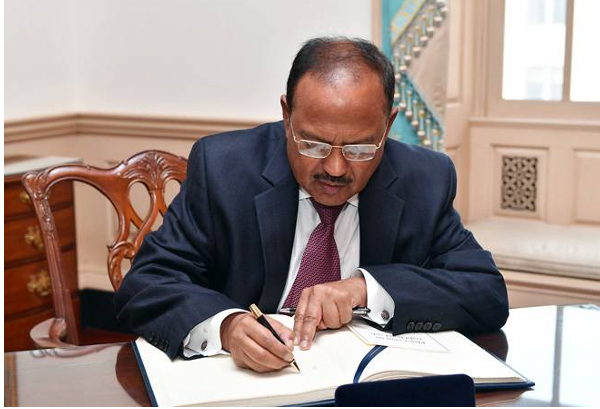NEW DELHI: Citing former UK prime minister Margaret Thatcher’s statement from the Eighties about the need to “starve terrorists of the oxygen of publicity”, national security advisor Ajit Doval on Monday called for pro-active perception management by the counter-terror agencies where only authorised and trained people brief the media on their version of a terror attack before the latter puts out information that “creates more terror in the society rather than prepare the society to fight terrorism”.
Stating that media was an important organ to fight terrorism, Doval told a conference of heads of anti-terrorism squads and special task force of various state police here on Monday: “Margaret Thatcher had said (that) if the terrorists take action and media is quiet about it, terrorism will end. They do it for publicity because then only you can terrorise people. If 10 people are killed somewhere in a very gruesome way and nobody comes to know about it, nobody will be terrorised. When somebody’s son is kidnapped and then killed while going to school by a terrorist, then a mother who is probably 500 miles from there will get terrorised that it could happen to her son as well. But if she does not know about it, she does not know.”
Asking if media perception of terrorism could be changed with the counter-terror agencies being more open and transparent, Doval noted that because “we can’t tell them many things and since we don’t tell them, they probably give out information and carry information which creates more terror in society rather than prepare the society to fight terrorism”
Doval suggested that someone authorised and trained to interact with the media be the first to give out facts regarding a terror act such as what exactly happened, in what way it happened, why it happened, what could be done and what the government was doing about it. “Probably they (the media) will be very supportive. Whenever they have been taken into confidence they have been very supportive. Because they want the society to know the right thing. Everybody knows a bomb blast has taken place and if you don’t tell them they will think probably 500 people are dead. You must tell them only two persons have died,” he stated.
Seeking pro-active participation of anti-terror wings of state police in exposing Pakistan’s involvement in terror acts, Doval suggested: “So many Pakistanis are arrested (by you)…there is no harm in giving out their identities and their plans to the media. Let the world know about it,” he said.
Thatcher had, while delivering a speech to the American Bar Association in 1985, stated: “We must try to find ways to starve the terrorist and the hijacker of the oxygen of publicity on which they depend. In our societies we do not believe in constraining the media, still less in censorship. But ought we not to ask the media to agree among themselves a voluntary code of conduct, a code under which they would not say or show anything which could assist the terrorists’ morale or their cause while the hijack lasted?”
Source: ToI
Image Courtesy: Business Today
You may also like
-
IAF Aircraft Set Course For Exercise Eastern Bridge VII At Oman
-
IAF Set To Host The Indian Defence Aviation Exposition-II At Jodhpur
-
Defence Secretary to co-chair 5th India-Philippines Joint Defence Cooperation Committee meeting in Manila
-
Simultaneous Launch Of ‘malpe And Mulki’, Fourth And Fifth Ships Of Asw Swc (Csl) Project
-
Aatmanirbharta in Defence: MoD signs Contract with HAL for 240 AL-31FP Aero Engines for Su-30MKI Aircraft
